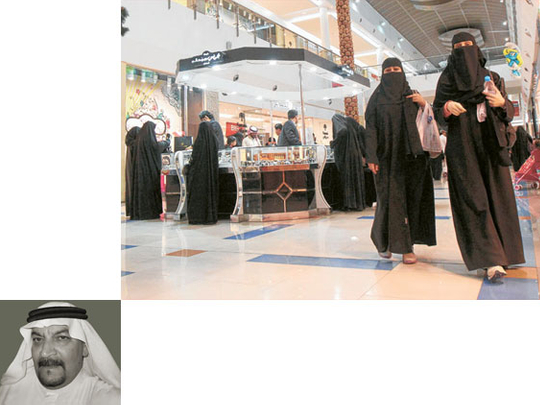
It would be unfair to malign all bureaucrats in Saudi Arabia as being idle all the time. Flush with petro-dollars and with time on their hands, some pursue very unusual ideas and set up the infrastructure to implement them.
Take the case of the Saudi Ministry of Commerce and Industry, which “is currently studying a proposal to set up four industrial cities in Riyadh exclusively for women”, as reported in a leading daily.
The news item goes on to say that after many hours spent thinking up such schemes and putting them on paper, “the Riyadh Chamber of Commerce and Industry (RCCI) has conducted feasibility studies on the projects and submitted them to the ministry for final approval. The cities will be fully devoted to manufacturing consumer goods”.
According to the chairman of the National Committee for Industries at the Saudi Council of Chambers, the four women-exclusive industrial cities will be set up in each corner of Riyadh.
The reasoning, according to the pundits at the chamber, is that the establishment of these cities would result in the even distribution of services to the capital’s residents, with the added benefit of offering more avenues of employment to the growing Saudi women workforce.
These cities are expected to match the existing mega-billion industrial cities spread across Saudi Arabia, most of which are heavily involved in oils and petrochemicals. The pundits further state that the four cities will be managed and run exclusively by and for women and would focus on more consumer goods industries such as “ready-made clothes, tailoring, confectionery, gold jewellery, assembly units for electronic appliances such as radio, television and computers”.
Trustworthy guards
To safeguard these industrial cities exclusively for women, the proposal demands that “the factories be surrounded by high fences to maintain safety and privacy. The projects also call for employment of trustworthy guards to watch the gates and oversee the movement of workers and visitors”.
The combined efforts of two ministries, Commerce and Municipal and Rural Affairs, are needed to “execute this vital project”, according to the RCCI spokesman.
Now, I understand that perhaps the motive behind the study was initially spurred by a desire to address the issue of rising women’s unemployment. But to address that with the suggestion of industrial cities exclusively for women raises far more questions than it resolves.
In the first place, this country relies heavily on imported labour to do the manual work in any large industry. And they are all men. Somebody has to undertake the physically strenuous work of setting up these cities. And those wearing hard hats in construction areas today are exclusively men. Are we expected to see Saudi women in over-alls soon?
Once such facilities are built, it takes an army of skilled tradesmen to keep the infrastructure intact and the operations running. Electricians, plumbers, welders, carpenters and the like are on 24-hour call in such cities. Their presence prevents or minimises any breakdowns resulting in production delays. Women opting for such professions are rare in this part of the world, and I would not be wrong to assume that in Saudi Arabia there are no more than a handful of women who have any experience at all as tradeswomen.
Feasibility studies
After these cities are built and secured with high fences, what would happen in the event of a fire or such calamity? Would exclusively male civil defence forces be allowed to enter an all-female environment to combat the blaze, or would the Commission for the Promotion of Good and the Prevention of Vice take an opposing stand? These issues are real and should be addressed in such studies.
And how do these industrial cities address the issue of women commuting to work? Present laws prevent women from driving. Will their fathers, husbands or drivers drop them outside the cities and let them find their way in, all covered in black, with the temperature outside hovering in the 50 degrees Celsius range? What if an emergency crops up and a woman has to leave her work site? How will she get around?
As for ‘trustworthy guards’, what will the selection criteria be? Are they going to be men? Would there be extensive background or psychological tests to determine their suitability for the job? Would they be armed?
Indeed, these ‘feasibility studies’ raise more questions than they answer. And fail to address one question. Is there a legitimate need for gender segregation in a professional environment or should women’s factories and businesses be absorbed in the industrial areas of any city?
Tariq A. Al Maeena is a Saudi socio-political commentator. He lives in Jeddah, Saudi Arabia.









